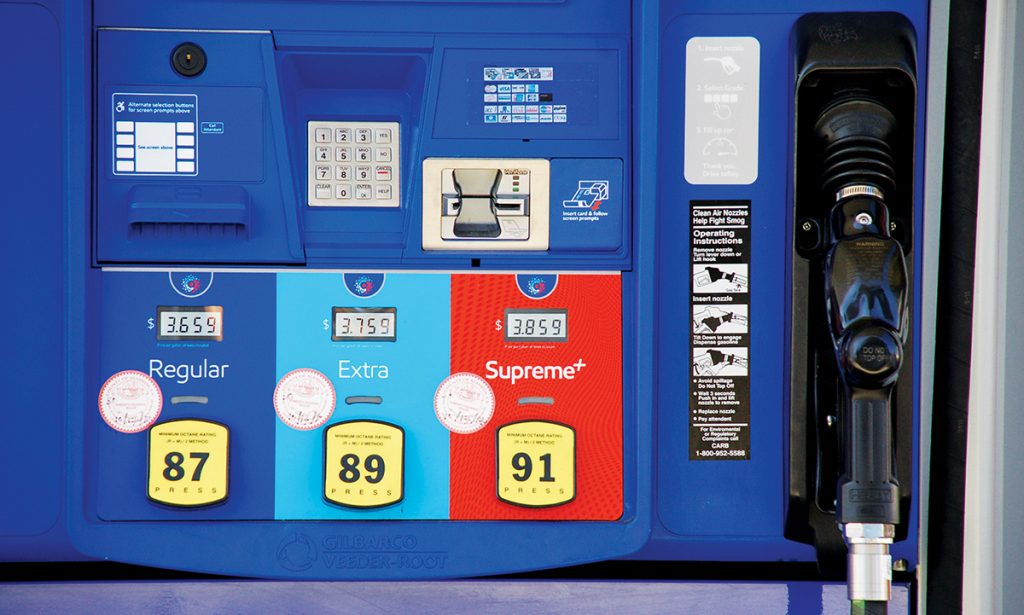
On November 6, California voters will weigh in on Proposition 6 to determine if Senate Bill 1’s gas tax increase will be repealed. Photo by Alec MacDonald.
Last year, the California legislature enacted Senate Bill 1 (Beall), which increased the state’s base gasoline tax by 12 cents. The law also hiked diesel taxes, implemented a vehicle transportation fee, and established a $100 annual payment on zero-emission cars, all with the promise of raising more than $5 billion annually for tackling a backlog of state and local transportation projects.
This plan to repair our crumbling roadways may prove short lived, however. Voters can repeal SB 1 if they pass Proposition 6 in the upcoming election. The ballot measure would not only eliminate the new taxes and fees, but also require that any future transportation tax and fee proposals be subject to voter approval.
Which way will voters turn this November — toward SB 1 or Prop 6? The outcome could be fueled, in part, by voter perceptions about who benefits from gas tax revenue, based on analysis of two separate studies. Also important are beliefs about how the state and local jurisdictions should collect, manage, and spend transportation funding.
The “Yes on 6” campaign, led by some lawmakers and taxpayer watchdog groups, wants to nix the SB 1 increases. They believe the money that would be generated won’t fix roads because it is a “blank check tax hike that has already been diverted away from road repairs,” according to the GasTaxRepeal.org website. The increase also hurts California’s working families, raising cost-of-living expenses for a typical four-person household by $800 per year, said Carl DeMaio, chairperson of Reform California and a leader of the Gas Tax Repeal campaign, in an August 10 San Francisco Chronicle opinion piece.
Forthcoming Bay Area bridge toll increases, greenlighted via Regional Measure 3’s June passage, compound the situation locally, said Ourania Riddle, secretary of the Solano County Taxpayers Association. Riddle lives in Dixon, where a half-cent sales tax measure for street maintenance also goes before voters in November.
“We need some accountability,” Riddle told the Monitor. “A lot of times during elections we hear promises … and people get elected and they forget all the promises.”
Instead, the Prop 6 campaign proposes the “Road Repair Accountability Initiative” to spend 100 percent of gas tax revenue on roads, use auto sales tax for voter-approved intermodal transportation projects, and establish efficiency reforms like competitive bidding.
For their part, Prop 6 opponents point out that SB 1 marked the first increase in the state’s base gas tax since 1994. They assert that the law is generating necessary proceeds for maintenance, repair, and safety improvements on state highways, local streets and roads, bridges, tunnels, and overpasses. Funding also extends to public transit, goods movement, and traffic congestion.
There’s lots of evidence that persistent potholes and other significant repair and maintenance issues need attention. The region-wide pavement condition index (PCI) is 67, which is considered “fair” for now but at risk of worsening if not addressed, according to Metropolitan Transportation Commission (MTC) data. Local road conditions in certain counties like Napa and Sonoma are further diminished, with some marked as “failed.”
Bay Area cities and counties are expected to receive $208 million from SB 1 in the current fiscal year, a 74 percent increase in their baseline state gas tax funding, according to materials from MTC’s July 13 legislative committee meeting.
The additional gas tax revenue, for which collection began last November, is already going to use. And Proposition 69, passed earlier this year, created lockbox protections to prevent state borrowing or raiding of that revenue for other non-transportation purposes.
“We’ve got a couple cities who have established this as the summer of paving,” said Tess Lengyel, deputy director of planning and policy for the Alameda County Transportation Commission during an August 31 interview. “Oakland is using SB 1 and Measure K and Measure BB funds to address an 80-year backlog of bad roads.”
Voting with Values
Research from the Mineta Transportation Institute (MTI) points to maintenance and safety as the most widely shared voter priorities, based on a summer survey asking Americans’ opinions about federal tax options to support transportation. It discovered the majority of respondents in favor of higher taxes, albeit under certain conditions. For example, 72 percent said they support a 10-cent-per-gallon gas tax increase to improve road maintenance. Support dwindled to 34 percent if the revenues were to be used more generally with “no additional detail.”
“Strong majorities of people are willing to pay more for transportation, including higher gas tax, if they believe money is spent for purposes they value,” said Dr. Asha Weinstein Agrawal, MTI’s director of education.
Also worth noting is that in the survey’s last eight years, gas tax support has been ticking upward for scenarios in which revenue is spent on the environment, whether to reduce air pollution or global warming.
Still, there are limits on voters’ willingness to open their wallets, especially when they have misconceptions about the cost of fuel tax. That’s according to a 2015 survey of California and Michigan voters who responded to questions about the cost of the gas tax in their state and if they’d support an increase to pay for road maintenance and improvements.
In general, people overestimate how much gas tax they pay, fueling misperceptions that sap tax support, said Professor Rob Wassmer, co-author of the survey and acting chair in the department of public policy and administration at California State University, Sacramento. Embedded in these findings are policy implications that suggest funding support is more likely when accompanied by education about gas tax rates and average payment amounts.
“The way to sell it to people is to tell them what they are spending,” Wassmer said.
Before SB 1’s 12-cent-per-gallon increase went into effect, California’s base excise tax was 18 cents a gallon. The Department of Motor Vehicle’s new vehicle transportation improvement fee now ranges from $25 to $175, depending on a car’s value. That’s up from the previous $53 base registration.
So, if a California driver consumes an average of 585 gallons of gas each year, then they are paying $70.20 more in gas tax when multiplied by 12 cents per gallon, according to calculations from Steve Wells, principal budget analyst at the California Department of Finance. Add to that the average transportation improvement fee of $47.85, and a California driver pays $118.05 more a year in gas taxes and fees. That works out to $9.83 a month, $2.27 a week, or 32 cents a day.
Wells estimated the average California driver paid roughly $350 a year in gas tax before SB 1, an amount that includes the state tax, local sales taxes and measures, and a two-cent underground storage maintenance fee. Also, part of the tab is the federal tax on gasoline. It’s 18.4 cents a gallon and hasn’t changed since it was last raised in 1993.
Drivers will see additional increases this July when the price-based excise gas tax resets to 17.3 cents a gallon, up from the current 9.8 cents a gallon. Combined base and price-based excise taxes will later be adjusted for inflation. Lastly, the annual $100 zero emission vehicle fee will begin in July of 2020.
With funding on the line, transit officials are stepping up with online pictures, videos, maps, and fact sheets to provide a clear picture of where projects aided by SB 1 are underway or complete. Rebuildingca.ca.gov was created last year by the California State Transportation Agency. The home page offers links to projects like one in Solano County, an area with PCI’s in the “worn to the point of repair” category, where chip seal repair on State Routes 84 and 220 is now complete.
MTC has introduced “Street Stories” to show cities like Fremont where the number of repaved miles has doubled and deferred maintenance projects in San Jose are no longer on the backburner.
“We are trying to do our best to get the word out about why we are opposed to [Prop 6] and the risk on the line with potential passage,” said MTC’s Rebecca Long.
While the state has explored alternatives, including road charges for miles traveled, the gas tax remains its best source of funding in the near term, transit officials said. The California Road Charge Pilot drew in 5,000 participants last year and proved successful. About 73 percent of participants said they felt a road charge was a more equitable transportation funding solution than the gas tax. But the idea still has kinks to work through related to privacy and system technology, as well as dealing with the trend toward fuel-efficient cars.
Said Wassmer: “At some point, when 50 percent of the street becomes electric, where’s the money going to come from to fund our roads?”
Cecily O’Connor covers transportation for the Monitor.

